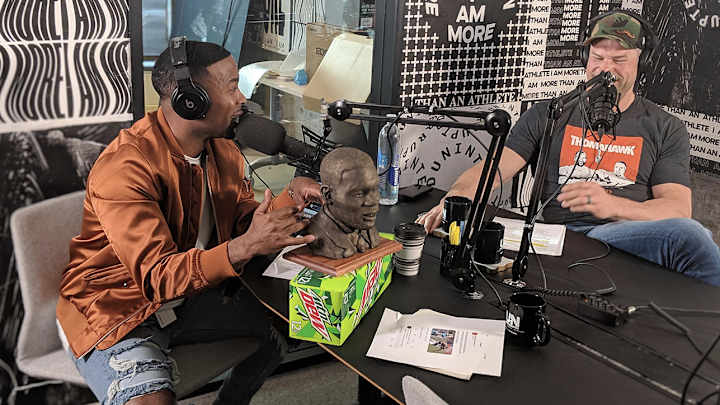An Ex-NFL Player's Path to Do-It-All Media Personality

Andrew Hawkins is either the future of sports media or a complete anomaly.
Anchoring the NFL’s digital coverage of its biggest events this year and serving as director of business development for athlete empowerment brand Uninterrupted, Hawkins has risen in the media field the same way the 5’7” central Pennsylvania native made his NFL dreams come true. He’s worked.
For his pro day at Toledo in 2008, Hawkins stuck an inch of clay under his heels and tucked five pounds of weights into his pockets. He still went undrafted and unsigned. So, he took a job with the Lions, scouting wideouts, learning what NFL teams looked for. He eventually landed a spot in the CFL, parlayed that into NFL opportunities, and in 2014 earned a four-year, $13.6 million contract with the Cleveland Browns. “I signed a big deal,” Hawkins says, “my version of a big deal.”
He’s recounting his journey for the umpteenth time having just ordered a Shirley Temple, buffalo wings, and fries for lunch. The order doesn’t say anything about Hawkins’s character besides the fact that, “I have the palate of a seven-year-old,” as he explains, but when an adult orders a Shirley Temple, buffalo wings, and fries, you put it in the story.
Anyway…
Established in the NFL, Hawkins didn’t stop hustling. As soon as he got to Cleveland, he began trying to reach LeBron James’s business manager, Maverick Carter. He didn’t want to hang out with The King; he wanted an internship.
In 2017 Hawkins got one, moving his family to Los Angeles for an entry level gig at James’s nascent Uninterrupted and flying to New York once a week to complete his MBA at Columbia. He signed with the Patriots that offseason, but during camp, Hawkins realized he could no longer commit everything to the sport. “I knew I was done,” he says, “I’d much rather be figuring out sports property problems from a business standpoint.”
So, the wideout hung up his cleats at 31 years old for a full-time job with Uninterrupted where Carter says he’s the perfect embodiment of the company’s credo. “He’s the definition of more than an athlete,” Carter says. “He had a grasp of what it meant to be an athlete in search of empowerment.”
In that first year, Hawkins helped create a feature on former teammate Josh Gordon—one of the biggest the company produced to that point, and as Uninterrupted grew, so did his responsibilities. The brand has expanded to merchandise and events, and Hawkins is now tasked with developing the company’s podcast lineup, overseeing the construction of an app for athletes, and managing merchandise collaborations. The app is an extension of an idea Hawkins initially had back as an intern.
“In five years I want people to see me and say, ‘Oh, I didn’t know you played in the NFL,’” Hawkins says. Most recently, Van Lathan, a friend and TMZ journalist, was taken aback to finally learn about Hawkins’s NFL past. “That was the best feeling for me,” Hawkins says.
Carter has also encouraged Hawkins’s on-air ascension. “You should do as much stuff as you have the ability to do because it will help you find what you really want to do,” Carter advised when Hawkins retired.
Hawkins started with a Sunday radio show on ESPN. “At the time,” he says, “it was just a way to watch football in peace.” He auditioned for the network’s Snapchat show on the same day it launched and was quickly added to the rotation, working to find the right tone for the platform. The only ex-pro hosting the daily show, he could safely have fun with the highlights without losing credibility.
He’ll be expected to generate more smiles at NFL Network while leading a new weekly studio show, The Trendzone, which will primarily live on Facebook Watch. Hawkins’s hire represents a significant investment by the league in digital-first talent. “We want to continue to evolve how we reach fans,” says Galen Gordon, vice president, talent management at the network.
A move to NFL Network also means once again teaming with former Browns left tackle Joe Thomas, the co-host of Uninterrupted's The ThomaHawkShow, which according to Spotify data is the most popular podcast in the state of Ohio. “Hawk resonates on the highest level,” NFL Media’s senior director for digital production Matt Schnider says. “The fact he can host, be an analyst, and switch gears from being someone appearing on the linear side to doing everything we’re about to do digitally, it’s rare.”
The question is how rare, because Hawk is now just one of several multiplatform ex-athletes who are making up for a lack of hardware with digital savvy and the work ethic it takes to make pro rosters.
Former punter Pat McAfee and wideout Nate Burleson, who had just one 1,000-yard season, are similarly rising in the NFL landscape with a variety of hosting and analyst positions across NFL Network, CBS, ESPN, and DAZN. Booger McFarland has broken into the Monday Night Football booth after eight years in the league as a defensive tackle. ESPN’s Jay Williams has risen too, teaming up with Kevin Durant and James’s production companies, while former fourth-liner Paul Bissonnette has quickly made a larger name for himself in the media world. This summer, Kendrick Perkins became the latest former role player to demonstrate media potential, mixing connections with charisma. More seem destined. “Individuals like us, we’re kicking down the door for the regular dude,” Burleson says.
Social platforms have given every athlete the chance to earn on-camera reps and develop content ideas—all while proving they can draw fans, building a brand without a multimillion-dollar shoe deal. Meanwhile league and union-organized training events have shown them what’s possible.
“Some of the guys fighting for roster spots, they see these other outlets and platforms as an opportunity to showcase another side of themselves,” ESPN director of digital video Steve Braband says. “Doing it by themselves while also being an athlete, I think that sets anyone up and gets you comfortable in front of an audience.”
Now they’ve emerged with stage presence, insight, and the ability to make athletes more comfortable than a comms-school hack ever could. While top broadcast teams and premier studios largely remain the domain of former stars, it’s easy to see a future where former role players are suddenly filling a bunch of other media roles—hosting programs, creating shows, interviewing stars, crossing over, expanding far beyond the typical ex-jock analyst mold in every direction.
“Fans are starting to see that we really do have good things to say besides clichés and the cut-ups you normally hear on TV if you do give us an opportunity,” Thomas says. Players Only is dead, but it also might be the future. It only makes sense that the athlete empowerment generation would produce an ex-athlete empowerment movement too.
“Look at the landscape, the media space, we’re trying to control it all,” Burleson says.
At last summer’s NFL broadcasting bootcamp, media coach Gerry Matalon experimented with a studio show practice session, letting the athletes serve as hosts as well as analysts. “There was such an enthusiasm for trying it,” he says, adding that Mike Mitchell and Mark Sanchez in particular excelled directing traffic.
Traditional hosts can serve as the voice of the fan, bringing relatable curiosity as well as making sure a show runs smoothly. “However,” Matalon says, “if former players put in the work and can perform in the hosting role well, it’s another career opportunity in the transition from playing football to talking football.”
On top of all his other commitments, Hawkins executive produced an animated short with Matthew Cherry, another rising NFL alum in media, as well as Jordan Peele. And he’s not done planning.
Acting? “I want to do it in a big way,” Hawkins says.
What about a front office job? “There are people in the league that I would work for,” Hawkins says, adding that he has already turned down three front office offers. “My goal was to be a general manager at first. I wanted to win a Super Bowl.”
At the same time, Hawkins admits he’s trying to curtail the extent to which FOMO is driving him in so many directions. If only Carter knew the result of telling the grinder to “do as much stuff as you have the ability to do.”
“I’m wearing myself thin,” Hawkins says. “I don’t know if I can do anything, but I will try.” There’s even one additional major project Hawkins has tied himself to: a biopic of his life. His second act, though, is just getting going.
